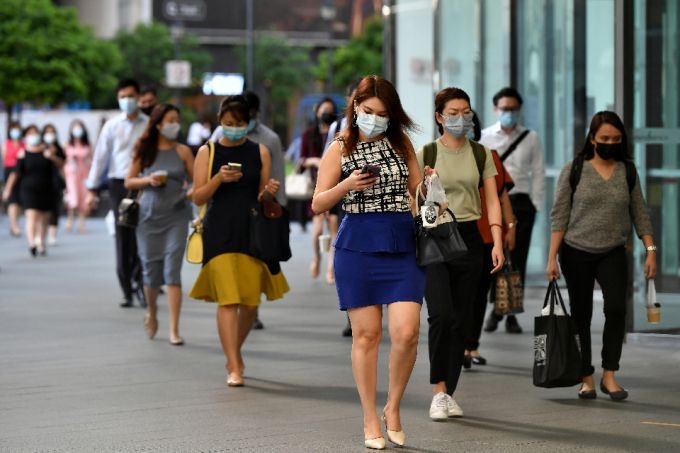CBD offices filling back up, but hybrid work may be here to stay

AS Singapore treads lightly in its transit to endemic Covid-19, the Republic's central business district is starting to show signs of life once again. Companies are embracing a hybrid working arrangement - albeit cautiously.
Since the easing of work-from-home (WFH) regulations from Aug 19, a majority of companies The Business Times (BT) spoke to said they were implementing split team or staggered arrangements covering working hours and meal times.
Some companies are more cautious than others. The manager of Dasin Retail Trust, for example, is only allowing fully vaccinated employees back into the office.
As for online brokerage iFast Corporation, it is adopting the government-recommended Vaccinate or Regular Test (VoRT) regime, where certain staff will be asked to perform the antigen rapid test regularly in view of their front-line roles.
In fact, vaccination is a key consideration for all companies as they weigh their back-to-the-office strategy.
Law firm TSMP will require returning employees to be fully vaccinated come mid-September 2021, although partners who lead teams will manage their own work flow. Joint managing partner Stefanie Yuen Thio said it is "impractical" to have a fixed system as the lawyers have to come in when the work demands.
Meanwhile, CGS-CIMB Securities' group head of human resources Han Yi Li said the company is bringing its staff back in a calibrated manner as vaccination rates rise and restrictions are eased.
As at Sept 11, 81 per cent of the Singapore population had completed both doses of Covid-19 vaccines, while 84 per cent had received at least one dose, according to data from Singapore's Ministry of Health.
But with Covid-19 cases in Singapore doubling this past week, the Ministry of Manpower (MOM) has said that companies with employees who were in the workplace at any time during the seven days prior to testing positive for Covid-19 must require all employees, who able to do so, to WFH for 14 days.
Several other companies have opted for a scaled-back return, adjusting based on their business needs as well as various government regulations.
For HSBC, capacity allocation is differentiated by departments based on business or customer needs. While the bank allows up to 50 per cent of its workforce back into the office, it is at present only 30 per cent filled.
Similarly, OCBC said it is moving to increase onsite employees while complying with current regulatory requirements to "ensure continued service levels" to its customers.
"We will continue to adapt our responses in tandem with the developing Covid-19 situation as well as the latest regulations to provide a safe working environment to our employees while maintaining optimal operations for the bank and our customers," said OCBC's head of group corporate security Francisco John Celio.
For some companies, however, WFH arrangements may be here to stay. Quite a few companies have chosen to embrace hybrid arrangements that will see sizeable proportions of their workforce working from home at any one time.
Social network companies Twitter and LinkedIn, for instance, are letting their employees decide on whether or not to come back to the office. For Twitter, the Singapore office will be reopened at reduced capacity for employees who are vaccinated starting Sept 13.
"While opening our offices is our decision, when and if our employees come back will be theirs. So if our employees are in a role and situation that enables them to work from home indefinitely or split their time between their home and the office, we will support that," Twitter's spokesman said.
LinkedIn has said it will operate on "a culture of trust", allowing every team and employee to decide what home-office split works best for them.
For IBM, too, the future of work is hybrid. "As a company with a sizable and widely distributed workforce, IBM has experienced first-hand that there is no one-size-fits-all approach," a spokesman noted.




